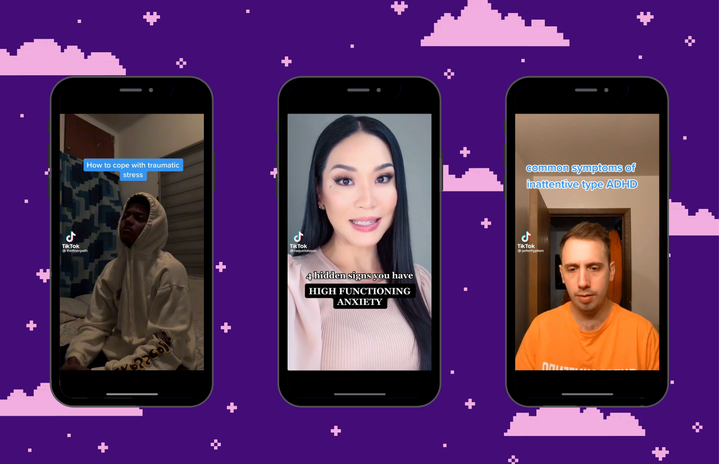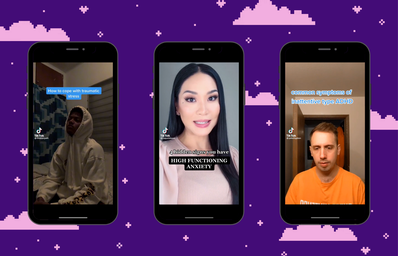Nowadays, it seems like many aspects of our lives are entirely dictated by what is trending on social media: Your new outfit is possibly the latest trendy piece of clothing on TikTok, your go-to dinner is derived from a popular ASMR cooking account, or the time you wake up is inspired by a trending aesthetic morning routine video on social media. The large impact of social media and influencers is nothing new, but now, there’s an epidemic of mental health influencers on social media that is affecting the conversations and perceptions around mental well-being.
There has been an increase of licensed therapists on social media, simultaneous to the rise of unlicensed mental health coaches who are speaking on the same topics, such as Raquel Olsson who is a former TV host that has been criticized for making misleading videos on mental health. As you scroll endlessly through social media platforms, it’s easy to get wrapped up in the content that you’re consuming without questioning what grounds the advice you’re listening to is based on.
As the conversation around mental health becomes more prevalent online, how far is too far for influencers when providing advice on mental well-being? Is the presence of free therapy and mental health advice damaging or helpful?
mental health influencers make the conversation mainstream, but leave out deeper mental illnesses.
On TikTok alone, the hashtag #mentalhealth has over 20 billion views, making it a valuable platform for mental health influencers to extend their reach. Mental health influencers post a variety of content on common mental health issues, such as ways to cope with anxiety and mental health hacks for everyone. This opens the conversation around mental health, but may lack the extensive help needed for people with mental illnesses.
Jor-El Caraballo, a licensed therapist and co-founder of mental health platform Viva, tells Her Campus, “I think there’s a lot to celebrate about having more conversations about mental health in the mainstream, and of course, celebrities and influencers of all varieties sharing their stories does help normalize the mental health experience so many of us experience throughout the lifespan. But, with the rise of influencers, we now see so many people treating mental health as a social and financial commodity.”
Though the advice provided by mental health influencers can be helpful, a lot of the advice provided is surface-level, such as saying overthinking is a symptom of high-functioning anxiety or feeling disconnected from the people around you means you have a dissociative disorder. Caraballo agrees that this goes against de-stigmatizing mental health because the advice given doesn’t work for a lot of people with more severe mental health issues that can’t be diagnosed or fixed through a 60-second video, which in the long run, causes people to feel worse than when they started. This surface-level advice stems from a lack of expertise.
He continues, “Simply put, because people who are not experts don’t have the experience, they likely don’t even realize the implications of sharing what they do. Many think if they are just ‘sharing my own experience,’ then that’s enough of a disclaimer but it’s often not, especially in the age of misinformation. This actually deters people from seeking actual therapy, further stigmatizing a legitimate health service because it’s only reserved for people who ‘really need it.’”
This age of mental health influencers has good intent, but raises questions about their reliability because they are profiting off making a viral video — do they actually want to help people, or are they just using their own mental health experiences as a source of income? VeryWell Mind explains that the content put out by mental health influencers is meant to be entertaining and thought-provoking to gain engagement, making it harder for it to be unique to viewers’ individual mental health concerns.
Caraballo says influencers are taking a reductive approach, which fails to acknowledge the variety of nuances to mental health treatment and coping strategies. This lack of individuality streamlines mental health and puts it into a single category, making mental health relatable content rather than a significant and individualized concern, since each person has a different mental health journey.
Unlicensed mental health influencers are increasing misinformation on social media.
A 2022 study done on the ethics of mental health influencers explains that viewers may not be able to confirm that a content creator is truly a professional therapist because platforms don’t require their users to accurately represent their professional identities, and audience members on the internet may not be aware of online resources in which all people can verify therapists’ licenses. With the presence of unlicensed mental health professionals giving advice, there is an increase in misinformation. Mental health influencers might share basic symptoms of depression online, for example, which can cause viewers to think they have depression when they may have another disorder. To curb this misinformation, TikTok started including mental health resources in their safety center in 2021 for their users. There have been many instances of advice that went viral on TikTok, but later was debunked. For example, intermittent fasting as a way to heal anxiety was a popular concept trending on TikTok, but then was proved to be false and damaging.
Influencers’ discussion of mental health exacerbates the issue of self-diagnosing.
According to a 2021 study on barriers to healthcare among U.S adults with mental health issues, the researchers found that fewer people are receiving mental health treatment due to not being able to afford it and lack of accessibility. Social media is completely free, making it an easily accessible resource for information. An article by Mashable says the discourse of mental health on social platforms like TikTok blurs the line between motivating viewers to seek mental health treatment and encouraging viewers to self-diagnose due to videos that mislabel widely felt emotions. According to Psychology Today, self-diagnosing raises several concerns, including missing a medical disease that is present because it is masqueraded by other psychological symptoms, or thinking you have a more severe form of mental illness than you actually do.
Furthermore, people are turning to mental health influencers and their content as a replacement for therapy. Caraballo agrees that the relationship between therapist and client is one of the most crucial parts of therapy that users are missing out on when they resort to social media therapeutic advice. He says, “Therapists engage with people in ways that influencers, coaches, and other people simply cannot, which makes the service unique and helpful. Without a thorough, and constant, exploration of self versus the client, things can go very wrong, and even be harmful.”
The presence of mental health influencers is opening up the conversation around mental health, but fails to provide actionable advice for mental health issues that are not experienced by everyone. There is a lack of expertise and credibility present that increases misinformation. Before you take advice from an influencer online, make sure to check where their information is coming from and what their credentials are, so that you’re gaining medical advice that will help your mental health rather than harm it.


